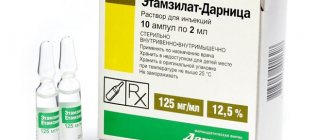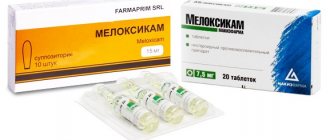Contraindications
Factors prohibiting the use of the drug include:
- presence of bronchial asthma;
- the manifestation of urticaria and an allergic reaction after the use of acetylsalicylic acid and other NSAIDs;
- liver failure in severe form or liver disease in the active phase;
- a history of severe renal failure;
- uncontrolled severe heart failure; diagnosed hyperkalemia;
- the presence of a peptic ulcer in the stomach or duodenum in the acute phase;
- active gastrointestinal bleeding, cerebral hemorrhage, or other types of bleeding;
- inflammatory diseases in the intestines at the acute stage; recent coronary artery bypass surgery;
- combined use of atazanavir and nelfinavir;
- during the third trimester of pregnancy or active lactation;
- failure to reach the minimum acceptable age (18 years);
- the presence of hypersensitivity to the components of the drug.
Medicinal properties
Esomeprazole is included in the tablet shell. Therefore, it is released immediately after entering the stomach and suppresses the secretion of hydrochloric acid, minimizing the adverse effects of naproxen on the digestive mucosa and preventing the development of ulcers.
Naproxen is placed in the core of the tablet and is released only after reaching the intestines. It relieves fever, relieves inflammation and swelling in joints, eliminates morning stiffness, muscle and joint pain, and helps increase range of motion. Therefore, naproxen has a therapeutic effect, and esomeprazole has a preventive effect.
Anti-inflammatory non-steroidal drugs negatively affect the gastric mucosa, leading to irritation, causing gastritis, erosion and ulcers. Therefore, doctors, along with such medications, prescribe drugs that protect the gastric mucosa. Vimovo already has such a drug (esomeprazole). Therefore, the drug has an anti-inflammatory effect and at the same time has an inhibitory effect on the proton pump (it is responsible for the production of hydrochloric acid).
Naproxen is eliminated within 9-15 hours after administration. About 95% is excreted in urine and 3% in feces. Esomeprazole is eliminated within an hour. About 80% is excreted in urine and less than 1% in feces.
Compound
The composition of the drug includes:
- naproxen and esomeprazole as the main active ingredients;
- croscarmellose sodium;
- povidone;
- colloidal silicon dioxide;
- magnesium stearate;
- hypromellose;
- macrogol;
- triethyl citrate;
- polysorbate;
- glyceryl monostearate;
- titanium dioxide;
- additives E216, E218, E1200, E172.
Analogs
Vimovo has no structural analogues. Based on the principle of action, several analogues of the drug are known, including “Artrum”, “Ibuprofen”, “Ketonal”.
"Artrum"
Biosynthesis, Russia Price from 300 to 400 rubles.
The active ingredient is ketoprofen. Available in tablets and ampoules, as well as in the form of suppositories and gel. Reduces inflammatory processes, lowers temperature, relieves swelling and pain. Prescribed for diseases of the musculoskeletal system.
pros
- Long-lasting (up to 18 hours)
- Quick effect when applied externally
Minuses
- Has a negative effect on the gastric mucosa
- Contraindicated for pregnant and lactating women, children under 15 years of age.
"Ketonal"
Lek, Slovenia Price from 190 to 250 rub.
The active ingredient is ketonal. Available in the form of tablets, capsules, suppositories, injection solution, cream. Inhibits inflammation, relieves heat and pain. It is used to eliminate symptoms accompanying diseases of the musculoskeletal system, as well as pain of various origins.
pros
- Almost instant action
- Relieves all types of pain
Minuses
- Has an adverse effect on the mucous membrane of the digestive system
- Contraindicated for pregnant and lactating women and children under 14 years of age.
"Ibuprofen"
Biosynthesis / Akrikhin / Kanonpharma, Russia, etc. Price from 20 to 80 rubles.
The active ingredient is ibuprofen. Available in the form of tablets, lozenges, dragees, capsules, suspension, syrup, drops. Stops inflammatory processes, relieves fever, eliminates pain. Recommended for pain syndrome, regardless of origin.
pros
- Helps with many types of pain
- Affordable price
- Can be prescribed to pregnant women and children (in a specially produced form).
Minuses
- Adversely affects the gastrointestinal mucosa
- Has side effects.
Side effects
If the dosage of the drug is exceeded, or certain contraindications are ignored, side effects may occur in different organ systems. These include:
- dyspepsia, pain in the upper abdomen;
- nausea, vomiting;
- diarrhea, constipation;
- dizziness;
- headache;
- insomnia, depression;
- vision and hearing impairments;
- dyspnea;
- fatigue;
- swelling;
- increased sweating.
Vimovo
The drug contains naproxen and esomeprazole, so it is possible to develop the same undesirable effects that were observed when using these active substances separately. Undesirable effects from the gastrointestinal tract, such as dyspepsia, stomach pain, nausea and vomiting, most often develop with the use of naproxen. During the development of the drug, esomeprazole was included in its composition to reduce the incidence of gastrointestinal side effects of naproxen. It was shown that when taking the drug, the incidence of gastric ulcers and adverse events in the upper gastrointestinal tract associated with NSAIDs was significantly reduced compared with naproxen monotherapy.
In placebo-controlled studies, the most common adverse events with Vimovo (n=490) compared with placebo (n=246) included diarrhea, upper abdominal pain, constipation, dizziness and peripheral edema, which are all adverse drug reactions with use. active substances separately. No new safety data were obtained when using the drug in the general patient population (n=1157) compared to the well-known safety profiles of the active substances naproxen and esomeprazole.
There were no differences in the types of adverse reactions when using the drug for 12 months compared to short-term therapy. Patients taking the drug were significantly less likely to discontinue therapy early due to adverse reactions compared to patients taking enteric-coated naproxen alone (7.9% versus 12.5%, respectively). The proportion of patients who discontinued treatment due to any upper gastrointestinal adverse event (including duodenal ulcers) while using the drug was 4% compared to 12% of patients receiving enteric-coated naproxen alone.
Adverse events are classified by frequency of development and organs and systems. The frequencies of undesirable effects were defined as: very common (> 1/10); frequent (>1/100 to 1/1000 to 1/10000 to
Naproxen
The following adverse events were observed in patients receiving naproxen during clinical trials and post-marketing:
Laboratory indicators: Infrequent/rare - increased liver enzyme activity, increased bleeding time, increased serum creatinine levels.
Cardiac disorders: often - palpitations; Infrequent/rare - arrhythmia, congestive heart failure, myocardial infarction, tachycardia.
Blood and lymphatic system disorders: Uncommon/rare - agranulocytosis, aplastic anemia, eosinophilia, granulocytopenia, hemolytic anemia, leukopenia, lymphadenopathy, pancytopenia, thrombocytopenia.
Nervous system disorders: common - dizziness, drowsiness, headache, lightheadedness, vertigo; Uncommon/rare: cognitive dysfunction, coma, convulsions, decreased concentration, optic neuritis, paresthesia, syncope, tremor.
Violations of the organ of vision: frequent - visual impairment; Uncommon/rare: blurred vision, conjunctivitis, corneal opacities, papilledema.
Hearing disorders and labyrinthine disorders: frequent - tinnitus, hearing impairment; Infrequent/rare - hearing loss.
Disorders of the respiratory system, chest and mediastinal organs: often - shortness of breath; Uncommon/rare - bronchial asthma, bronchospasm, eosinophilic pneumonitis, pneumonia, pulmonary edema, respiratory depression.
Gastrointestinal disorders: common - dyspepsia, abdominal pain, nausea, vomiting, diarrhea, constipation, heartburn, peptic ulcers, stomatitis; Uncommon/rare - dry mouth, esophagitis, stomach ulcers, gastritis, glossitis, belching, flatulence, stomach and duodenal ulcers, gastrointestinal bleeding and perforation, melena, hematemesis, pancreatitis, colitis, exacerbation of inflammatory bowel disease (ulcerative colitis , Crohn's disease), non-peptic gastrointestinal ulcer, rectal bleeding, ulcerative stomatitis.
Renal and urinary tract disorders: Uncommon/rare - glomerulonephritis, hematuria, interstitial nephritis, nephrotic syndrome, oliguria/polyuria, proteinuria, renal failure, renal medullary necrosis, renal tubular necrosis.
Disorders of the skin and subcutaneous tissues: common - itching, bruising, purpura, skin rash; Uncommon/rare - alopecia, exanthema, urticaria, toxic epidermal necrolysis, erythema multiforme, erythema nodosum, persistent drug-induced erythema, lichen planus, systemic lupus erythematosus, Stevens-Johnson syndrome, photosensitive dermatitis, photosensitivity reactions, including cases of rash like cutaneous porphyria tarda (pseudoporphyria), exfoliative dermatitis, angioedema.
Musculoskeletal and connective tissue disorders: Uncommon/rare - muscle weakness, myalgia.
Metabolic and nutritional disorders: Uncommon/rare - loss of appetite, fluid retention, hyperglycemia, hyperkalemia, hyperuricemia, hypoglycemia, changes in body weight (associated with edema/fluid retention).
Infections and infestations: often - diverticulitis; Infrequent/rare - aseptic meningitis, infection, sepsis.
Vascular disorders: Uncommon/rare - increased blood pressure, decreased blood pressure, vasculitis.
General disorders and reactions at the injection site: often - fatigue, swelling, sweating, thirst; Infrequent/rare - asthenia, malaise, fever.
Immune system disorders: Uncommon/rare - anaphylactic reactions, anaphylactoid reactions, hypersensitivity reactions.
Liver and biliary tract disorders: Uncommon/rare - cholestasis, hepatitis, jaundice, liver failure.
Disorders of the reproductive function and mammary glands: Infrequent/rare - infertility, menstrual irregularities.
Mental disorders: often - depression, insomnia; Infrequent/rare - agitation, anxiety, confusion, unusual dreams, hallucinations, nervousness.
Esomeprazole
The following adverse drug reactions were observed or suspected in patients receiving enteric-coated esomeprazole during clinical trials and/or post-marketing. None of these adverse reactions were dose dependent.
Disorders of the blood and lymphatic system: Rare - leukopenia, thrombocytopenia; Very rare - agranulocytosis, pancytopenia.
Nervous system disorders: often - headache; infrequently - dizziness, paresthesia, drowsiness; rarely - taste disorder.
Visual disturbances: rarely - blurred vision.
Hearing and labyrinthine disorders: uncommon - vertigo.
Disorders of the respiratory system, chest and mediastinal organs: rarely - bronchospasm.
Gastrointestinal disorders: often - abdominal pain, diarrhea, flatulence, nausea/vomiting, constipation; uncommon - dry mouth; rarely - stomatitis, gastrointestinal candidiasis; very rarely - microscopic colitis.
Renal and urinary tract disorders: very rarely - interstitial
Drug interactions
The combination of Vimovo with antiretroviral drugs is prohibited. Due to the similarity in action of the main active components, such a combination may lead to side effects.
With caution and constant monitoring of the patient's health status, it is worth combining the drug with acetylsalicylic acid. The same applies to diuretics, selective serotonin reuptake inhibitors, ACE inhibitors, corticosteroids and lithium preparations. Only in cases of extreme necessity, in combination with Vimovo, methotrexate, sulfonylurea derivatives, warfarin, beta-blockers, cyclosporine, probenecid, as well as drugs for the absorption of the acid-base balance in the stomach are prescribed.
special instructions
- If Vimovo is prescribed to patients with kidney pathologies, then during the treatment process it is necessary to keep the condition of the urinary system under control. If it worsens, the medicine is discontinued. If necessary, the doctor may reduce the daily dosage.
- If the patient has previously suffered from an ulcer, then it is necessary to start taking it with a small dose.
- You should take the medicine with caution if you have hypertension, arterial diseases, cerebrovascular accidents, diabetes mellitus, hyperlipidemia, hypovolemia, coronary heart disease, as well as people who smoke.
- It is not recommended for people suffering from cardiovascular pathologies to combine Vimovo with diuretics and acetylsalicylic acid, which can aggravate the disease.
- Elderly patients should take the medicine only under the strict supervision of a doctor, as they have an increased risk of complications.
- Due to the possible occurrence of dizziness, as well as impaired visual and auditory function, a careful approach requires taking the drug in people driving vehicles, as well as those engaged in activities that require special attention.
- Women in the first and second trimesters of pregnancy can take Vimovo only under strict indications and under the close supervision of a doctor.
- Patients who take the medicine for a long time should also be under the supervision of a doctor. Low acidity weakens the barrier function of the stomach, which increases the likelihood of intestinal infections. With a long-term change in acidity to the neutral side, the formation of benign neoplasms is possible. But when you stop taking Vimovo, a reverse development of tumors is observed.
The pleasure is not cheap
The price of a Vimovo package with 60 tablets averages from 1200 to 1400 rubles. Sometimes in some pharmacies the cost of the product can reach up to 1,600 rubles.
On the Russian market you can buy the following analogues of Vimovo, many of which are cheaper, but it is far from certain that they are more effective and safer:
- Artrum;
- Ibufen;
- Brustan;
- Strepsils Intensive;
- Nurofen;
- MIG 400;
- Dexalgin;
- OKI;
- Teraflex Advance;
- Flexen;
- Ketoprofen.
Voice of the people - here lies the truth
After studying the reviews of ordinary people, you can form a final opinion about the drug Vimovo.
After the appearance of osteochondrosis, unbearable pain immediately began. I immediately started taking Nurofen without a doctor’s recommendation, and I still regret it. After 3 months of taking it, I started having stomach problems and an ulcer.
It turns out she treated one, crippled the other. I had to see a doctor, after an examination he replaced Nurofen with Vimovo, this remedy has the same effect, but does not have a harmful effect on the stomach. Of course, I have greatly alleviated my suffering, but I still cannot cure the underlying disease.
Lydia, 59 years old
Before reaching retirement, I had to quit my job because my knee joints began to hurt badly. And my job is difficult, I’m constantly on my feet, I just couldn’t stand it anymore, and I didn’t want to let my colleagues down.
I didn’t take painkillers because I had stomach problems and an ulcer. But still, the pain was unbearable; sometimes walking a few meters was an incredible challenge for me. After the examination, the doctor prescribed treatment and prescribed the drug Vimova to relieve pain. Yes, it really doesn’t affect the stomach and relieves pain quickly!
Nadezhda, 53 years old
Methods of using Vimovo and dosage
Vimovo tablets are intended for oral use, 1 piece 2 times a day. The drug should be taken no earlier than 30 minutes before meals. Swallow the tablet whole (without crushing, breaking or chewing) with a sufficient amount of water.
For patients with mild to moderate renal and hepatic insufficiency, Vimovo is prescribed with caution and under careful monitoring of renal and liver functions. According to the doctor's indications, it is possible to reduce the daily dosage of the drug or use an alternative therapy regimen.
Patient reviews
The doctor advised me to use Vimovo when my knee hurt. I take it regularly, there is no discomfort now.
Boris I.
An excellent remedy, especially after a course of Ketanol. I feel great now and have had no side effects.
Irina G.
I took Vimovo tablets for arthritis, for which I tried a lot of other drugs.
But this one turned out to be the best. It is also good because it does not burden the liver, since its active ingredients affect only a certain area. Marina K.
For what indications is the product used?
The medication is used to reduce pain in the following diseases:
- osteoarthritis therapy;
- with spondylitis;
- to relieve pain and inflammation during the treatment of rheumatoid arthritis;
- other forms of arthritis;
- to relieve pain from peptic ulcers of the stomach and duodenum.










